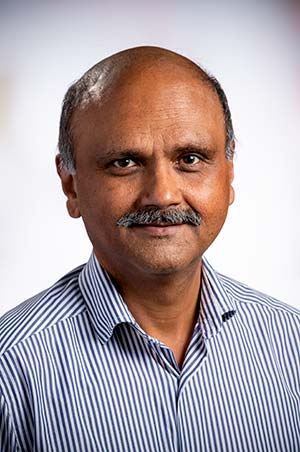Kikkeri N. Naresh, MBBS, DCP, MD, FRCPath
Professor
Translational Science and Therapeutics Division, Fred Hutch
Section Head, Pathology
Fred Hutch
Member
Immunotherapy Integrated Research Center (IIRC), Fred Hutch
Member
Translational Data Science Integrated Research Center (TDS IRC), Fred Hutch
Dr. Kikkeri Naresh is a pathologist, an expert in the laboratory analysis of tissue samples for diagnosis or other medical purposes. He specializes in hemopathology — the pathology of blood tissues — especially lymphoma and bone marrow pathology. As a translational researcher, Dr. Naresh conducts laboratory studies to improve patient care. His focus is the biology of lymphoma, including its genome, formation and cellular environment (or microenvironment). He also develops new algorithms to improve lymphoma diagnosis and precision medicine. His other research interests include lymphoma-causing viruses, blood stem cell transplantation and plasma cell myeloma.
Contact by phone
Academic queries: 206.667.1286
Clinical queries: 206.606.1343
Other Appointments & Affiliations
Affiliate Investigator, Clinical Research Division, Fred HutchAffiliate Investigator
Clinical Research Division, Fred Hutch
Professor, Department of Laboratory Medicine & Pathology
University of Washington School of Medicine
Pathologist
Fred Hutchinson Cancer Center
Visiting Professor
Imperial College London, UK
Education
Royal College of Pathologists London, UK, 2008, FRCPath - Haematology, by published work
Specialist Training Authority (STA) of the Royal Colleges certified specialist in Histopathology (Anatomic Pathology; Board certification equivalent), London, UK, 2003
Royal College of Pathologists London, UK, 2001, MRCPath - Haematology, by published work
Jawaharlal Institute of Postgraduate Education & Research (JIPMER), 1988, MD - Pathology (Board certification equivalent)
Government Medical College, Mysore, India, 1985, Diploma in Clinical Pathology (DCP)
Government Medical College, Mysore, India, 1980, MBBS (MD equivalent)
Research Interests
Lymphoma biology: Genomics of various lymphomas; Early steps and lesions in lymphomagenesis and pathways of evolution; biology of Immune deficiency lymphoid proliferations including proliferations in post-transplant and HIV setting; biology of Hodgkin lymphoma
Lymphoma diagnosis and precision medicine: Developing diagnostic and precision medicine algorithms using contemporary technologies; biomarker discovery
Tumor microenvironment: Lymphomas & lymphoproliferative disorders and other hematological malignancies
Biology of oncogenic viruses: in lymphomagenesis and patient outcomes
Immune biology of hematopoietic stem cell transplantation Disease evolution following stem cell transplantation
Epidemiology and molecular epidemiology of lymphomas and hematological malignancies
Translational research in plasma cell myeloma
Clinical Expertise
Pathology of lymphomas and lymphoproliferative disorders – histology, immunohistochemistry, genetics and genomics – integrated diagnosis
Bone marrow pathology – morphology, immunohistochemistry, immunophenotyping (flow cytometry), genetics and genomics – integrated diagnosis
Transplantation pathology – diagnosis of diseases and conditions after hematopoietic stem cell transplantation
Cancer pathology
Current Studies
2020-2022
Project Title: Lymphomas and its precursors in the Consortium’s 13-county catchment area – understanding differences between counties and comparison with nation-wide data
Grant Type: Catchment Area Pilot Award from Cancer Center Support
Role: Co-Investigator (PI: Teresa Hyun, MD PhD)
Goal: Lymphoma incidence varies between the 13 counties – age-adjusted incidence rate (2014-2018) is lowest in San Juan (17.1) and highest in Grays Harbor (30.2). As lymphoma is not a single disease, it is likely that the differences in incidence of individual lymphoma types is far more staggering. We are addressing the questions: a) Given the known differences in the incidence rate between the 13 counties of the consortium, are there significant differences in the incidence of specific lymphoma type/s? b) Will such differences translate to differences in the prevalence of lymphoma precursors? c) Could an infective or an environmental agent be causally associated with these differences?
External Committees/Collaboration
2018- Pathology Lead, project on multi-omics of WHO categories of haematological malignancies – Duke Univ. USA with >12,000 samples
2020- Member, Scientific Advisory Committee, Lister Institute, UK
2020- Member of the Scientific Advisory Board (SAB) for the National Medical Research Council (NMRC) Singapore’s programme titled “The Singapore lYMPHoma translatiONal studY (SYMPHONY)”
2020- Member, International Committee & International Regional Advisor for the Americas – Royal College of Pathologists, UK
2020- Invitation by the WHO to contribute chapters on lymphoma to the classification of urological and male genital organs neoplasms.
